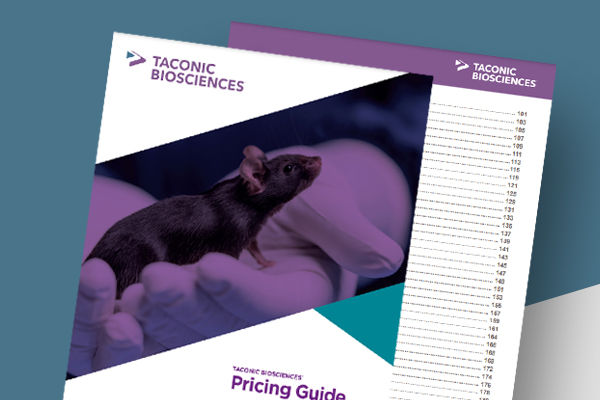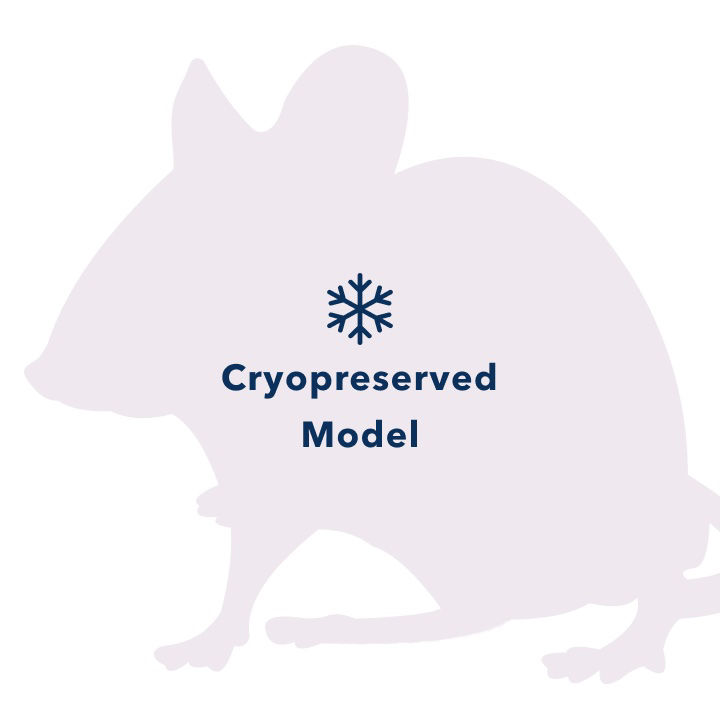| Model No. | Nomenclature | Genotype |
|---|---|---|
| 11510 | STOCK Trp53tm1Brn Brca1tm1Brn Tg(KRT14-cre)8Brn | Inquire for genotype |
Brca1-Associated Breast Cancer Model

- Description
- Related Products & Services
- Price & Licensing
- Overview
- Genetics
- Guides & Publications
- Applications & Therapeutic Areas
- Transit, Housing & Welfare
- Diet
Overview
Nomenclature: STOCK Trp53tm1Brn Brca1tm1Brn Tg(KRT14-cre)8Brn
- Breast cancer model driven by tissue specific deletion of Brca1 and p53 in epithelial cells.
- Conditional mouse mutant with somatic deletion of Brca1 and Trp53 in several epithelial tissues including mammary epithelium and skin. Female mice of this strain show a high incidence of mammary tumors that mimic many aspects of human BRCA1-mutated basal-like breast cancer.
- Contains conditional disruptions of the Brca1 gene, germline mutations of which are responsible for 40% to 50% of hereditary breast cancers, and the Trp53 tumor suppressor gene, the most commonly mutated gene in human cancers.
- Literature references report that 80% of females develop mammary tumors with a tumor onset between 140 and 280 days.
- This model may be helpful in predicting responses of human BRCA1-deficient tumors to therapies.
- Can be used to supply tumor tissues for allografts.
- Non mammary epithelial skin tumors are reported to develop in 20-30% of mice.
Origin
This mouse line was developed in the laboratory of Jos Jonkers of the Netherlands Cancer Institute (NKI). The model was developed by mating conditional Trp53 mice with K14Cre transgenic mice, and the resultant offspring were crossed with conditional Brca1 mice. The conditional Brca1 mouse was generated by injection of ES cells containing a Brca1 allele with floxed exons 5-13 into C57BL/6 blastocysts. Resultant chimeras were crossed with FVB/N mice to produce outbred heterozygous offspring (Liu 2007). The conditional Trp53 mouse was generated by targeting a 13.5 kb genomic clone encompassing Trp53 exons 1-11 in 129P2-derived ES cells of the E14 sub-clone IB10. Targeted ES cells were injected into C57BL/6 blastocysts and resulting chimeras were crossed with FVB/N mice to produce outbred heterozygous offspring (Jonkers 2001). The K14cre transgenic mice were derived by pronuclear injection of the transgene into FVB/N one-cell stage embryos according to standard procedures. The K14cre transgene includes a 2.1 kb human K14 gene promoter fragment followed by a 0.65 kb rabbit β-globin intron, the Cre coding sequences and a 0.63 kb transcription termination/polyadenylation fragment of the human growth hormone gene (Jonkers 2001). Taconic received stock in 2011, and the line was derived by embryo transfer. The colony was maintained by mating females which are homozygous for both of the floxed genes and wild type for the Cre with males which are homozygous for both of the floxed genes and carriers for the Cre.
This model is cryopreserved and available for recovery. Models can typically be recovered and delivered to customers within 12 weeks after order receipt. Purchase of this model includes perpetual use rights and a deliverable of four mutant animals at the Murine Pathogen Free™ health standard along with a genotyping protocol. For models which include a recombinase gene or multiple alleles, all alleles will be provided, but individual animals may not contain all mutant alleles.
Taconic’s Colony Management experts can design a plan to grow your colony faster.
Genetics
Guides & Publications
Initial Publication:
Liu X, Holstege H, van der Gulden H, Treur-Mulder M, Zevenhoven J, Velds A, Kerkhoven RM, van Vliet MH, Wessels LF, Peterse JL, Berns A, Jonkers J. (2007) Somatic loss of BRCA1 and p53 in mice induces mammary tumors with features of human BRCA1-mutated basal-like breast cancer. Proc Natl Acad Sci U S A. 2007 104(29):12111-6.
Rottenberg S, Nygren AO, Pajic M, van Leeuwen FW, van der Heijden I, van de Wetering K, Liu X, de Visser KE, Gilhuijs KG, van Tellingen O, Schouten JP, Jonkers J, Borst P. (2007) Selective induction of chemotherapy resistance of mammary tumors in a conditional mouse model for hereditary breast cancer. Proc Natl Acad Sci U S A. 104(29):12117-22.
Rottenberg S, Jaspers JE, Kersbergen A, van der Burg E, Nygren AO, Zander SA, Derksen PW, de Bruin M, Zevenhoven J, Lau A, Boulter R, Cranston A, O'Connor MJ, Martin NM, Borst P, Jonkers J. (2008) High sensitivity of BRCA1-deficient mammary tumors to the PARP inhibitor AZD2281 alone and in combination with platinum drugs. Proc Natl Acad Sci U S A 105(44):17079-84.
Pajic M, Iyer JK, Kersbergen A, van der Burg E, Nygren AO, Jonkers J, Borst P, Rottenberg S. (2009) Moderate increase in Mdr1a/1b expression causes in vivo resistance to doxorubicin in a mouse model for hereditary breast cancer. Cancer Res. 69(16):6396-404.
van Leeuwen FW, Buckle T, Kersbergen A, Rottenberg S, Gilhuijs KG. (2009) Noninvasive functional imaging of P-glycoprotein-mediated doxorubicin resistance in a mouse model of hereditary breast cancer to predict response, and assign P-gp inhibitor sensitivity. Eur J Nucl Med Mol Imaging. 36(3):406-12.
Issaeva N, Thomas HD, Djureinovic T, Jaspers JE, Stoimenov I, Kyle S, Pedley N, Gottipati P, Zur R, Sleeth K, Chatzakos V, Mulligan EA, Lundin C, Gubanova E, Kersbergen A, Harris AL, Sharma RA, Rottenberg S, Curtin NJ, Helleday T. (2010) 6-thioguanine selectively kills BRCA2-defective tumors and overcomes PARP inhibitor resistance. Cancer Res. 70(15):6268-76.
Pajic M, Kersbergen A, van Diepen F, Pfauth A, Jonkers J, Borst P, Rottenberg S. (2010) Tumor-initiating cells are not enriched in cisplatin-surviving BRCA1;p53-deficient mammary tumor cells in vivo. Cell Cycle. 9(18):3780-91.
Zander SA, Kersbergen A, van der Burg E, de Water N, van Tellingen O, Gunnarsdottir S, Jaspers JE, Pajic M, Nygren AO, Jonkers J, Borst P, Rottenberg S. (2010) Sensitivity and acquired resistance of BRCA1;p53-deficient mouse mammary tumors to the topoisomerase I inhibitor topotecan. Cancer Res. 70(4):1700-10.
Rottenberg S, Vollebergh MA, de Hoon B, de Ronde J, Schouten PC, Kersbergen A, Zander SA, Pajic M, Jaspers JE, Jonkers M, Lodén M, Sol W, van der Burg E, Wesseling J, Gillet JP, Gottesman MM, Gribnau J, Wessels L, Linn SC, Jonkers J, Borst P. (2012) Impact of intertumoral heterogeneity on predicting chemotherapy response of BRCA1-deficient mammary tumors. Cancer Res. 72(9):2350-61.
Zander SA, Kersbergen A, Sol W, Gonggrijp M, van de Wetering K, Jonkers J, Borst P, Rottenberg S. (2012) Lack of ABCG2 shortens latency of BRCA1-deficient mammary tumors and this is not affected by genistein or resveratrol. Cancer Prev Res (Phila). 5(8):1053-60.
Zander SA, Sol W, Greenberger L, Zhang Y, van Tellingen O, Jonkers J, Borst P, Rottenberg S. (2012) EZN-2208 (PEG-SN38) overcomes ABCG2-mediated topotecan resistance in BRCA1-deficient mouse mammary tumors. PLoS One. 7(9):e45248.
Warmoes M, Jaspers JE, Xu G, Sampadi BK, Pham TV, Knol JC, Piersma SR, Boven E, Jonkers J, Rottenberg S, Jimenez CR. (2013) Proteomics of genetically engineered mouse mammary tumors identifies fatty acid metabolism members as predictive markers for cisplatin resistance. Mol Cell Proteomics. Feb 8.
Applications & Therapeutic Areas
- Oncology & Immuno-Oncology
Transit, Housing & Welfare
Need more info? Click the live chat button or Contact Us
Diet
- Services
- Licensing
- Pricing - USD
- Pricing - EUR
- Select my Health Standard
- Get Custom Pricing Guide
Brca1-Associated Breast Cancer Model
This model is sold under terms which grant perpetual use rights.
Pricing - USD
11510-EZcohort-4
| Item | Commercial | Nonprofit |
|---|---|---|
| Cryopreserved Model | $ 34,650.00 | $ 23,100.00 |
Cryopreserved models are invoiced upon shipment of recovered animals. Once orders are placed, the full purchase price will be applied if the order is canceled. For orders greater than 4 animals, please contact Taconic for options.
Fees for Taconic Transit Cages™ and freight are in addition to the price above.
Pricing - EUR
11510-EZcohort-4
| Item | Commercial | Nonprofit |
|---|---|---|
| Cryopreserved Model | 26.250,00 € | 22.050,00 € |
Cryopreserved models are invoiced upon shipment of recovered animals. Once orders are placed, the full purchase price will be applied if the order is canceled. For orders greater than 4 animals, please contact Taconic for options.
Fees for Taconic Transit Cages™ and freight are in addition to the price above.
Select my Health Standard
Need help choosing the right Taconic Biosciences health standard for your research?
Use the Health Standard Selector to enter your exclusion list. The tool will tell you which health standards meet your requirements.
Get custom pricing guide
Schedule A Scientific Consultation
Speak with a PhD-level Field Application Scientist who can help you select the most appropriate model and maximize your experimental success.















.jpg)

.jpg)
.jpg)
.jpg)
.jpg)





.jpg)


.jpg)
.jpg)

.jpg)


.jpg)





.jpg)

.jpg)





